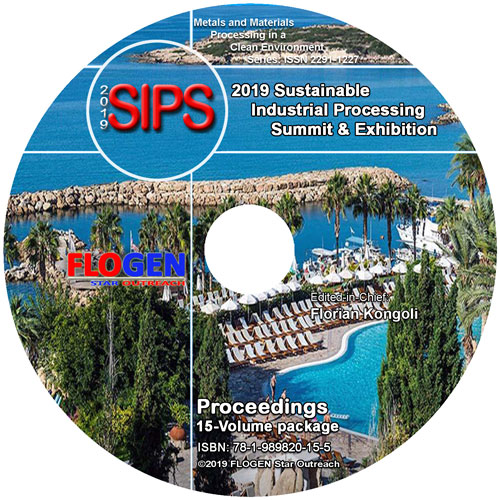2019-Sustainable Industrial Processing Summit
SIPS2019 Volume 1: Angell Intl. Symp. / Molten Salt, Ionic & Glass-forming Liquids: Processing and Sustainability
| Editors: | F. Kongoli, M. Gaune-Escard, J. Dupont, R. Fehrmann, A. Loidl, D. MacFarlane, R. Richert, M. Watanabe, L. Wondraczek, M. Yoshizawa-Fujita, Y. Yue |
| Publisher: | Flogen Star OUTREACH |
| Publication date: | 20 December 2019 |
| Pages: | 177 pages |
| ISBN: | 978-1-989820-00-1 |
| ISSN: | 2291-1227 (Metals and Materials Processing in a Clean Environment Series) |

CD shopping page
Peculiarities of Electro-reduction of Lithium Carbonate in Chloride-carbonate Melts
Sergei Kuleshov1; Inessa Novoselova2; Valeriy Bykov3;1INSTITUTE OF GENERAL AND INORGANIC CHEMISTRY, Kiev, Ukraine; 2INSTITUTE OF GENERAL AND INORGANIC CHEMISTRY, Kyiv, Ukraine; 3INSTITUTE OF PHYSICS, Kiev, Ukraine;
Type of Paper: Regular
Id Paper: 96
Topic: 13
Abstract:
During the last decade, the problem of the greenhouse effect is widely covered in the media and scientific literature. Among the all pollutants in the earth's atmosphere, carbon dioxide plays a key role in climate changes. It absorbs the long-wave radiation and is one of the factors contributing to the greenhouse effect in the atmosphere. Therefore, the problem of the effective disposal of carbon dioxide is an urgent task of scientists around the world. In order to reduce CO2 emissions, the technologies for its capture and utilization are being developed [1-3]. Many methods of carbon dioxide utilization are discussed. They are aimed at converting CO2 into commercially beneficial products such as chemicals, polymers, building materials, fuel, etc.
High-temperature electrochemical synthesis (HTES) in molten salts is one of the promising methods due to the simplicity of hardware implementation and mild synthesis conditions. Also, HTES is a low cost method. It was shown [4] that the electro-reduction of carbonates anions in chloride melts occurs with kinetic difficulties (the previous chemical reaction of the acid-base type) and the electrochemically active particle is CO2.
In the present work, the results of the cyclic voltammetry study in the molten salt system Na,K|Cl - xLi2CO3 (x = 1*10-4 - 2*10-3 mol/cm3 Li2CO3 concentration) against Pt and Pb|PbCl2 reference electrodes at temperature 750 oC in air and argon atmosphere are presented. The composition and morphology of the cathode products obtained under varied experimental parameters were investigated.
There are two cathodic waves (K1 and K2) observed at CV curves at the potentials of -1.25 and -1.5 V against Pb|PbCl2 reference electrode in argon atmosphere.
Potentiostatic electrolyzes at potentials of the first and second waves were carried out. According to results of XRD method the cathodic product of both waves is carbon. The results of SEM showed that the morphology of the product produced at different potentials is not the same. Samples obtained at a potential of the first wave contain particles with plate form. Other ones (electrolysis at second wave) contain spherical carbon particles of very high dispersity. This may indicate the different nature of the electrochemically active particles that are involved in electrode reactions. The mechanism of electrode processes based on acid-base interactions occurring in melts is proposed.
Keywords:
Carbon; Characterization; Chloride; Electrochemical; Electrodeposition; Electrolysis; Moltensalt;References:
[1] J. Lau, G. Dey, S. Licht, Energy Convers. Manage. 122 (2016) 400-410.[2] W. Weng, L. Tang, W. Xiao, J. Energy Chem. 28 (2019) 128-143.
[3] I.A. Novoselova, S.V. Kuleshov, S.V. Volkov, V.N. Bykov, Electrochim. Acta 211 (2016) 343-355.
[4] Yu.K. Delimarskii, V.I. Shapoval, V.A. Vasilenko, Russ. J. Electrochem. 7 (1971) 1301-1304.